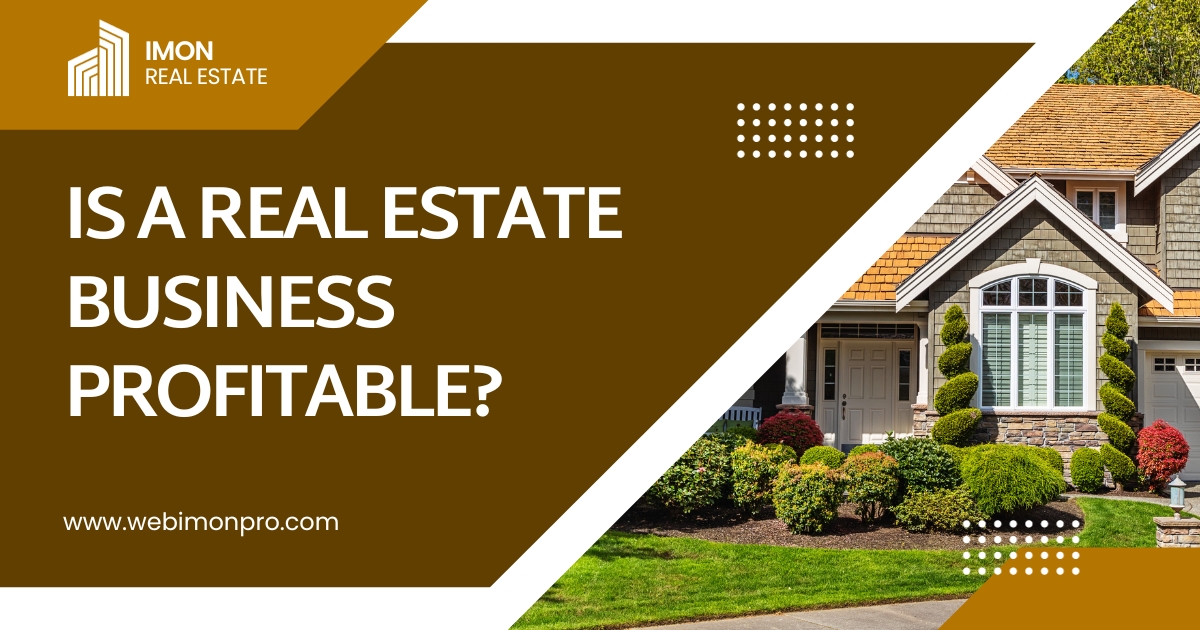The simple answer to this question is, yes—if you handle your assets intelligently. “Entrepreneurs have the necessary experience and basic business acumen to kickstart their own real estate business,” says Martin Orefice, Founder of Rent To Own Labs. “Plus, they have the financial capital to invest, which is a huge advantage when stepping into the real estate business.”
The most common way a real estate business can be profitable is through appreciation. Appreciation is an increase in the value of an asset over time. The asset can be residential properties, commercial properties, and even undeveloped land. The increase can occur for a variety of reasons, such as increasing demand with a decreasing supply. Achieving profit in your real estate business comes through selling your asset after it increases in value—secondly, real estate profits from generating income through regular payments or rent.
Real Estate Profits Through Appreciation
For residential properties, the biggest factor that attributes to appreciation is location. An evolving neighborhood that adds better schools, new shopping centers, playgrounds, or anything that makes the area a more desirable place to live adds value to the home. Home improvements, whether interior or exterior, can also add a significant amount of value. In turn, your real estate business can make large amounts of profit through house flipping or rehabbing. Commercial properties work similarly to residential by gaining profit through developments in location and improving the property.
In terms of underdeveloped land, profits are also generated through development. As a city expands, the land outside its limits becomes more desirable to those who wish to develop it. Once a developer starts to build houses or commercial buildings, the value of the land increases even higher.
Real Estate Profits Through Income
Simply put, residential and commercial real estate generate income through rent. Tenants pay an agreed-upon amount per month which can increase through inflation and demand. After your costs are taken out, you claim the remaining portion as income. A smart move for your real estate business is to invest in a property in a desirable location, offering you the ability to secure tenants easily.
Depending on your rights to the land, raw land can also generate income as companies may pay regular payments for any new structures built on the land or royalties for any discoveries made. These include but are not limited to new access roads, pipelines, cell towers, pipelines, or pump jacks. It is common for raw land to be rented for agricultural purposes, and some land may have valuable harvestable assets that can be collected periodically.

[Contact us to make your beautiful Real Estate website. Our Expertise will help you to Start your Real Estate Business and grow your Brand Identity]
Examples Of A Real Estate Business
There are so many jobs within the real the real estate industry, many of which would be great opportunities for starting a business. Here are just some of the many examples of various real estate businesses:
- Wholesaler
- Real Estate Bird Dog
- Fix and Flip
- Buy And Hold
- Vacation Property Owner
- Property Manager
- Real Estate Developer
- Real Estate Appraiser
- Home Inspector
- Real Estate Agent
- Real Estate Broker
- Home Maintenance Provider
- Home Stager
- Construction Contractor
- Hard Money Lender
The above options are just some of the many ideas out there for starting a real estate business. Remember, there are numerous opportunities to choose from you just have to find the right fit.
Top 5 Benefits Of Starting A Real Estate Investment Business
The benefits that come with investing in real estate are nearly endless. Not only do you have to ability to make a sizable profit on every deal, but also, real estate is proving to be a solid hedge against the stock market and inflation. Some other benefits that are guaranteed to come with starting a real estate business include but are not limited to:
- Tax Benefits. If you gross $100,000 per year at your nine to five job and I earn $100,000 per year from my rental property, who gets to keep more after taxes? You guessed it; my rental property is taxed much lower because the government rewards rental property owners. The government also offers lower tax rates on long-term profits along with other benefits like depreciation and the exclusion of self-employment tax.
- Cash Flow. Real estate investors can receive a substantial cash flow from steady wholesale or rehab deals, but they can also ensure themselves a secure monthly cash flow with rental property deals. The best part about rental property cash flow is that the extra money is considered a passive income after all of your bills are paid. You get to collect a monthly paycheck while managing the rest of your investing business.
- Appreciation. While you are paying off the loan of whatever property you invested in, the value of that property is increasing or appreciating. While things like recessions and market fluctuations are bound to occur, it is safe to say that the value of real estate will increase over an extended period of time. That being said, any property you purchase today will be worth far more 30 years from now; however, with a fixed-rate mortgage, you will always be paying the same dollar amount.
- Control. Arguably the greatest benefit of starting a real estate business is the control and pride you feel due to owning something you created. Your destiny is not tied to an office on Wall Street or your company’s CEO; it only belongs to you. Real estate investing puts you and you alone in the driver’s seat of your financial future. With control, however, investors also need to learn how to manage their appetite for unfamiliar situations; or, as Roy Morejon puts it, entrepreneurs need to “be comfortable with being uncomfortable.” As the president and co-founder of Enventys Partners and a serial entrepreneur, Morejon is well aware of the control entrepreneurs must exercise over their emotions. Regardless of your own experience, “you have to be comfortable with the idea that you won’t always know where you stand financially for a time period,” says Morejon.
- Security. Of course, investing of any kind will always be associated with some risk. However, steadily building a real estate portfolio over time means that you are securing your own future. Unfortunately, too many individuals today have no specific plan for how they will secure their retirement. Real estate investing is not only what some say is the fastest way to get out of debt but is an undeniable method of creating for yourself multiple streams of income that will continue well into your retirement years and can even be passed on to future generations.
It is not advised to jump into the real estate investing world without first properly educating yourself. You must learn the best ways to find deals, market yourself, negotiate, and finance deals; however, once you’ve mastered those, you’ll be on your way to maintaining a successful business. So my partners at CT Homes and I put together a comprehensive list of the most common questions for you to study before embarking on your investing journey. Start from the top and work your way down and once you’ve thoroughly analyzed each question, you’re sure to already be ahead of your competition.
How Much Does It Cost To Start A Real Estate Business?
It’s hard to pinpoint exactly how much you need to start a real estate business, but between $5,000 and $10,000 should help you get started. The fees to file an LLC are much lower — typically between $40 and $500 depending on your state. However, the rest of the start-up funds will cover any material costs, the time needed to attend events and build a network, any office supplies (such as a laptop), design fees for a website and logo, and more. While you don’t necessarily need to spend money on any of these things, they can help you get more serious about your business. Plan out your own budget, taking each of these costs into account, and see what you come up with. Many investors are even able to start wholesaling with no money.
Summary
Starting a real estate business can sound overwhelming, but by following the above steps as well as familiarizing yourself with the answers to commonly asked questions, becoming a real estate professional will be easier than you’d think. Be sure to define your goals, review your finances and prioritize networking to build your circle and watch your business flourish. With the right tools, your business has the potential to help you achieve your goals and become financially free.
Ready to start taking advantage of the current opportunities in the real estate market?
Click here for a 30 minutes free consultation and get started learning how to invest in today’s real estate market!





